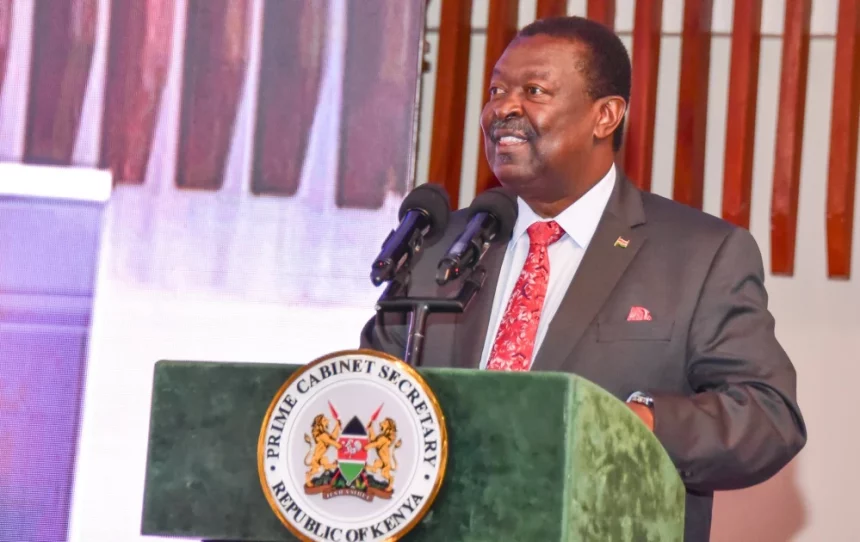African countries have been urged to be self-reliant and wean themselves from excessive dependence on external development assistance.
Prime Cabinet Secretary, Musalia Mudavadi has said Africa should work on putting in place necessary infrastructure and implement reforms that will increase exports and shares in global trade.
He also said that all national financial institutions must be empowered and strengthened to allow them channel funding to sustainable investments more effectively.
“We must empower our local financial institutions. This will require new governance structures and enhanced capacities, at the national, regional and continental levels.” said Mudavadi.
He made the remarks in Nairobi during the launch of the 2023 edition of Africa’s development dynamics report under the African Union Commission’s 6th edition of the specialized technical committee on finance, monetary affairs, economic planning and integration.
According to him, African countries should take concrete actions to overcome the recent slump and unleash the wave of sustainable investments needed to achieve these ambitious goals.
For instance, he said sovereign access to cheap capital is key and the international community has to live up to its promises.
“Through the African Union, we need to continue to press for a reallocation of IMF Special Drawing Rights, same as we continue pressing for a seat at the G20. This is especially to pressure meaningful acknowledgement of African countries’ vulnerability to Climate Change and our importance in carbon mitigation,” he said.
“Africa must counter negative risk perceptions by both foreign and African investors. We should encourage and enable risk assessments that are unbiased, thus making available risk mitigation strategies unknown to investors,” he urged.
Mudavadi noted that dependable risk assessment must be evidence-based and this cannot happen without better and reliable data.
“We (Africa) should strive to be innovative and continue to actively pursue new methodologies of appraising risks in African countries. Establishment of an African credit rating agency is imperative,” he affirmed.
The Prime Cabinet Secretary also highlighted some of the factors that have made Kenya a leading investment hub in East Africa and called on other continental players to foster economic integration and prosperity.
“Kenya’s experience is that investment at scale can only be mobilized if an enabling business environment is in place. As many of you are aware, before World Bank’s Ease of Doing Business Index was discontinued, Kenya jumped from rank 129 in 2014 to rank 56 in 2019. Significantly, we benefit from a thriving financial services sector,” he explained.
Mudavadi also said the success story of Kenya’s mobile banking is well known, even as the sector keeps evolving as more digital services build on M-Pesa and other mobile banking platforms.
Often overlooked in these harsh economic times, he regretted, is that Kenya stands as the country with the largest institutional investors in East Africa.
He added that it is high time for African leaders and her people to engage in a candid conversation on how to navigate the global economic crisis following the devastating shocks of the COVID-19 pandemic; compounded by the effects of security threats, conflicts and climate change.
According to Mudavadi, financial assets managed by Kenyan pension funds amounted to 12 per cent of Gross Domestic Product (GDP) between 2015 and 2020.
This was the fourth-highest share in Africa, only behind the outlier cases of Namibia (98 per cent), South Africa (84 per cent), and Botswana (53 per cent).
Despite these success stories, he said the available institutional investors resources should be well regulated and applied directly towards sustainable development.
Currently, alternative assets like infrastructure, real estate, green and sustainable assets, private equity and venture capital account for less than 3 per cent of institutional investor portfolios in Kenya’s pension market.
To this end, he said Kenya is making efforts to mobilize these funds. He said Kenya’s Retirements Benefits Authority (RBA) has implemented regulatory reforms to support proper management and growth of this critical sector.
At the same time, the Kenya Pension Fund Consortium is playing an important role in coordinating and activating those funds for infrastructure projects.
He said Kenya has also become a hub for regional value chains among them in the agriculture service and manufacturing sectors, as a result of Government’s deliberate policies and programmes.
“The conditions have allowed more public and development funds to trigger more private investments. It should, however, be noted that none of the success factors are related to our natural resource endowments,” he stated.
This, he noted, makes investment flows to Kenya more resilient to global shocks and commodity prices.
To date, development finance institutions have mobilized by far the highest amount in the region, US$ 3.9 billion to Kenya in the form of private finance.



